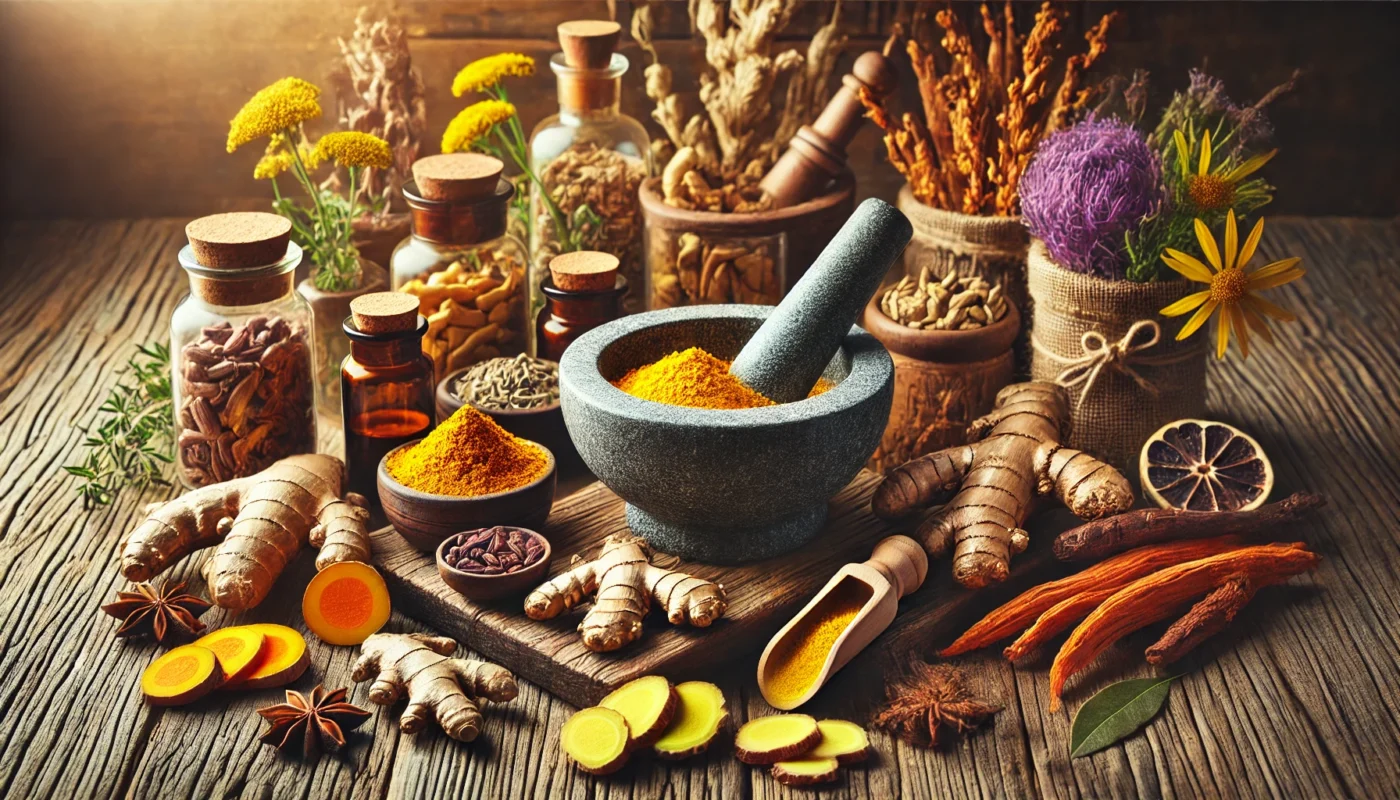Prednisone is a common medication prescribed for a variety of health conditions. It’s a synthetic corticosteroid that works by suppressing the immune system and reducing inflammation.
However, long-term use of prednisone can lead to unwanted side effects. These can include weight gain, osteoporosis, and an increased risk of infection. As a result, many individuals are seeking natural alternatives to prednisone.
This article aims to explore these natural alternatives. We’ll delve into the science behind them and how they can be applied in a practical way. Our focus will be on holistic and alternative health approaches for managing inflammation and autoimmune diseases.
We’ll discuss natural corticosteroids produced by the body and how certain plants contain phytochemicals with anti-inflammatory properties. We’ll also explore the role of diet, exercise, and lifestyle changes in managing inflammation.
Moreover, we’ll look at the potential benefits and risks of using herbal supplements as natural prednisone substitutes. It’s important to note that while these alternatives can be beneficial, they should be used under the guidance of a healthcare provider.
Our goal is to provide a comprehensive understanding of these alternatives. We hope to empower you with knowledge, enabling you to make informed decisions about your health.
So, let’s embark on this journey of exploring natural alternatives to prednisone.
You may also like: Top Supplements to Speed Up Injury Recovery
Understanding Prednisone and Its Side Effects
Prednisone is a powerful corticosteroid. It is often prescribed to treat a variety of inflammatory and autoimmune conditions. This medication can effectively control inflammation by mimicking the effects of hormones your adrenal glands naturally produce.
Despite its efficacy, prednisone is not without its drawbacks. The medication is notorious for a range of side effects, especially with long-term use. Patients frequently report weight gain, a common side effect due to increased appetite and fluid retention caused by prednisone.
Another significant concern is the impact of prednisone on bone health. Long-term usage can lead to osteoporosis, making bones brittle and fragile. This risk makes it crucial for users to monitor their bone density and consider protective measures.
Prednisone can also weaken the immune system over time. A suppressed immune system heightens the risk of infections, which is concerning for users with preexisting health issues. Patients must remain vigilant about infections and maintain regular health check-ups.
Mood swings and changes in behavior are additional side effects. Some users report feelings of anxiety, irritability, and difficulty sleeping. These psychological effects can significantly impact an individual’s quality of life.
Given these potential side effects, many seek natural alternatives to prednisone. They hope to reap the benefits of inflammation reduction without the risks associated with synthetic corticosteroids. In the following sections, we’ll explore viable natural strategies to manage inflammation.
The Body’s Natural Corticosteroids
The human body naturally produces corticosteroids through the adrenal glands. These hormones play a critical role in regulating inflammation and the immune response. They help maintain homeostasis by managing stress and contributing to metabolic processes.
Corticosteroids produced by the body include cortisol and aldosterone. Cortisol helps control blood sugar levels, reduces inflammation, and regulates metabolism. It is often referred to as the body’s natural stress hormone due to its integral role in the fight-or-flight response.
When the body’s own production is insufficient, synthetic substitutes like prednisone are prescribed. However, understanding and supporting the body’s natural ability to produce these hormones can potentially decrease the need for medications. This could lead to a more balanced approach to managing conditions related to inflammation and autoimmunity, fostering a healthier internal environment.

Herbal Alternatives to Prednisone
Many turn to herbal remedies to avoid the potential side effects of prednisone. These natural alternatives offer anti-inflammatory benefits and may help manage autoimmune disorders.
Herbs like turmeric, ginger, boswellia, and licorice root have shown promise. Each offers unique compounds that can mimic or enhance the effects of corticosteroids.
Their use is often steeped in traditional practices. Modern research supports their efficacy, though often with a need for more comprehensive studies.
When considering herbal options, it’s vital to understand their potential interactions. Consulting with a healthcare professional is always advisable.
Key Herbal Alternatives:
- Turmeric and Curcumin
- Ginger
- Boswellia
- Licorice Root
These herbs can be incorporated into your diet or taken as supplements. They add both culinary and medicinal value when chosen wisely.
Turmeric and Curcumin
Turmeric, a vibrant yellow spice, is prized for its active component, curcumin. Curcumin is noted for its powerful anti-inflammatory and antioxidant properties.
Studies have shown that curcumin can inhibit inflammatory pathways in the body, offering potential relief. Its effects can closely mimic those of corticosteroids without their side effects.
Ginger
Ginger, a well-known culinary spice, boasts gingerols, compounds with strong anti-inflammatory effects. It has been used in traditional medicine for centuries.
Current research highlights ginger’s effectiveness in reducing joint pain and swelling, especially in rheumatoid arthritis. It’s a natural complement to a balanced diet for inflammation control.
Boswellia
Boswellia, or Indian frankincense, has gained attention for its anti-inflammatory properties. It works by inhibiting inflammatory enzymes in the body.
Traditionally used in Ayurvedic medicine, boswellia can help alleviate symptoms of chronic inflammatory conditions. It’s a promising alternative for those seeking natural remedies.
Licorice Root
Licorice root contains glycyrrhizin, a compound with corticosteroid-like effects. It may bolster the body’s own anti-inflammatory processes.
While offering significant benefits, licorice root must be used cautiously. Prolonged use or high doses can lead to imbalances and adverse effects. Always consider professional guidance when using herbal options to ensure safe and effective outcomes.
Nutritional Support for Inflammation Reduction
Diet plays a crucial role in managing inflammation. Certain foods can naturally reduce inflammatory markers in the body. Incorporating these foods can be an effective strategy to complement other anti-inflammatory measures.
A variety of foods contribute to inflammation reduction. Among these, omega-3 fatty acids, antioxidant-rich foods, and foods supporting gut health stand out.
Making informed dietary choices involves understanding which foods to include and which to avoid. Focusing on whole, unprocessed foods often yields the best results.
Key Nutritional Components:
- Omega-3 fatty acids
- Antioxidant-rich foods
- Probiotics and fermented foods
By understanding and utilizing these nutritional components, you can take significant steps toward managing inflammation. A targeted dietary approach can serve as a natural prednisone substitute.
Omega-3 Fatty Acids
Omega-3 fatty acids are well-known for their potent anti-inflammatory effects. Found in fish such as salmon, mackerel, and sardines, they help regulate inflammation pathways.
Regular consumption of omega-3s has been linked to reduced inflammation and improved heart health. Incorporating these into your diet supports a balanced inflammatory response.
Antioxidant-Rich Foods
Foods high in antioxidants play a key role in combating oxidative stress. Berries, leafy greens, and nuts are excellent choices.
Antioxidants neutralize free radicals, reducing inflammation-related damage. A diet rich in these foods supports overall health and may reduce chronic inflammation.
Probiotics and Gut Health
Gut health is intimately connected to inflammation. Probiotics, found in yogurt and fermented foods, enhance beneficial gut bacteria.
A balanced gut microbiome can modulate inflammation, potentially reducing autoimmune flare-ups. Supporting gut health is a foundational aspect of a comprehensive anti-inflammatory diet.

Lifestyle Changes to Complement Natural Alternatives
Incorporating lifestyle changes can significantly bolster the effects of natural alternatives. A holistic approach considers physical activities, stress management, and sufficient rest.
Regular exercise has numerous benefits for inflammation and immune function. It boosts circulation, helping to deliver nutrients and oxygen where they’re needed most.
Reducing stress is equally important. Stress exacerbates inflammation, often leading to increased symptoms in autoimmune conditions.
By incorporating these lifestyle changes, individuals can work towards a more balanced and holistic health strategy. Here’s a quick overview:
- Engage in regular physical exercise
- Practice stress management techniques
- Ensure adequate sleep for recovery
These steps can enhance the effectiveness of natural anti-inflammatory measures. Integrating them can lead to improved overall health and wellness.
Exercise and Physical Activity
Physical activity acts as a natural anti-inflammatory. It decreases inflammatory markers and supports a healthy immune system. Whether through walking, yoga, or more intense workouts, regular movement is key.
Exercise also aids in maintaining a healthy weight, which is crucial for reducing inflammation. Aim for consistency; even moderate exercise can have profound benefits.
Stress Management Techniques
Managing stress is vital in reducing inflammation. Techniques such as mindfulness, deep breathing, and meditation are beneficial.
These practices help in regulating the body’s stress response, thereby minimizing its impact. Consistent practice can improve emotional well-being and reduce stress-induced inflammation.
Sleep and Recovery
Sleep is critical for recovery and inflammation reduction. Aim for 7-9 hours per night to facilitate repair processes. Quality sleep supports the body’s natural healing mechanisms, providing a solid foundation for improved health.
The Role of Supplements and Vitamins
Supplements and vitamins can play a pivotal role in managing inflammation. They provide an additional boost alongside natural remedies and lifestyle changes.
These supplements may address specific deficiencies that contribute to inflammatory conditions. For instance, many people are deficient in key vitamins that support immune function.
When considering supplements, consult with a healthcare provider. It’s essential to ensure they are appropriate for your individual health needs.
Here’s a list of some beneficial supplements and vitamins:
- Vitamin D: Supports immune health and inflammation reduction
- Magnesium: Helps regulate inflammatory responses
- Omega-3 Fatty Acids: Reduces inflammation through improved cell function
- Quercetin: A flavonoid with anti-inflammatory properties
- Ashwagandha: An adaptogen that helps the body manage stress
Each supplement offers unique benefits that can complement a balanced diet. However, quality and dosage are crucial for effectiveness.
Vitamin D and Magnesium
Vitamin D is crucial for modulating the immune system. It helps reduce inflammation and has a protective role against certain autoimmune diseases.
Magnesium plays an essential role in numerous biochemical reactions, including inflammatory processes. It helps regulate cellular functions and can alleviate symptoms of chronic inflammation.
Both nutrients are vital. They work synergistically with lifestyle changes and dietary adjustments for managing inflammation efficiently.
Herbal Supplements and Adaptogens
Herbal supplements offer natural ways to address inflammation. Adaptogens like ashwagandha help the body manage stress, which can exacerbate inflammation.
Herbs such as boswellia and turmeric are also beneficial. They contain compounds known for their anti-inflammatory properties.
Choosing high-quality herbal supplements is crucial. Verify the purity and potency to ensure these remedies effectively complement your health regimen.

Integrating Natural Alternatives into Your Health Regimen
Transitioning to natural alternatives requires a thoughtful approach. First, assess your current treatment plan and identify areas that might benefit from natural interventions.
Start with small changes, integrating one or two natural remedies. This gradual approach can help determine which alternatives work best for you without overwhelming your routine.
Consult a healthcare provider before making significant changes. They can ensure that natural options won’t interfere with existing treatments or conditions.
Tracking your progress is crucial. Keep a health journal to note any changes in symptoms, energy levels, and overall wellbeing after introducing new supplements or lifestyle changes.
Be patient with the process. Natural alternatives may take time to show results. Consistency is key for seeing long-term benefits in managing inflammation.
Balance is essential. While natural options offer valuable support, they may work best alongside conventional treatments. Consider an integrative approach for comprehensive care.
Stay informed and flexible in your wellness journey. New studies and discoveries offer ongoing opportunities to refine your strategies and improve your health regimen.
Above all, listen to your body. Personalizing your health plan based on your unique needs will yield the most effective results and enhance your overall wellbeing.
Conclusion: A Balanced Approach to Managing Inflammation
Finding harmony in managing inflammation involves blending natural and conventional methods. Integrating natural alternatives alongside standard treatments can enhance overall health outcomes.
Adopting a holistic mindset is key. Consider diet, lifestyle, and supplements tailored to your needs. This comprehensive approach fosters long-term health and wellness.
Listening to your body’s signals is crucial in crafting a personalized plan. Each individual’s response to treatments is unique, requiring adjustments for maximum benefit.
By embracing an open mindset, you gain the ability to evolve your strategies. Stay informed, remain flexible, and prioritize your well-being in this dynamic journey to health.
Further Reading:
6 natural alternatives for prednisone
Prednisone alternatives: What can I take instead of prednisone?
8 natural supplements to help fight inflammation
Physical activity, anti-inflammatory, immune system, stress management, mindfulness, sleep, recovery, supplements, vitamins, Vitamin D, Magnesium, Omega-3, Quercetin, Ashwagandha, herbal supplements, adaptogens, inflammation management, natural remedies, holistic health, wellness, health journal, integrative approach.
Important Note: The information contained in this article is for general informational purposes only, and should not be construed as health or medical advice, nor is it intended to diagnose, prevent, treat, or cure any disease or health condition. Before embarking on any diet, fitness regimen, or program of nutritional supplementation, it is advisable to consult your healthcare professional in order to determine its safety and probable efficacy in terms of your individual state of health.
Regarding Nutritional Supplements Or Other Non-Prescription Health Products: If any nutritional supplements or other non-prescription health products are mentioned in the foregoing article, any claims or statements made about them have not been evaluated by the U.S. Food and Drug Administration, and such nutritional supplements or other health products are not intended to diagnose, treat, cure, or prevent any disease.

